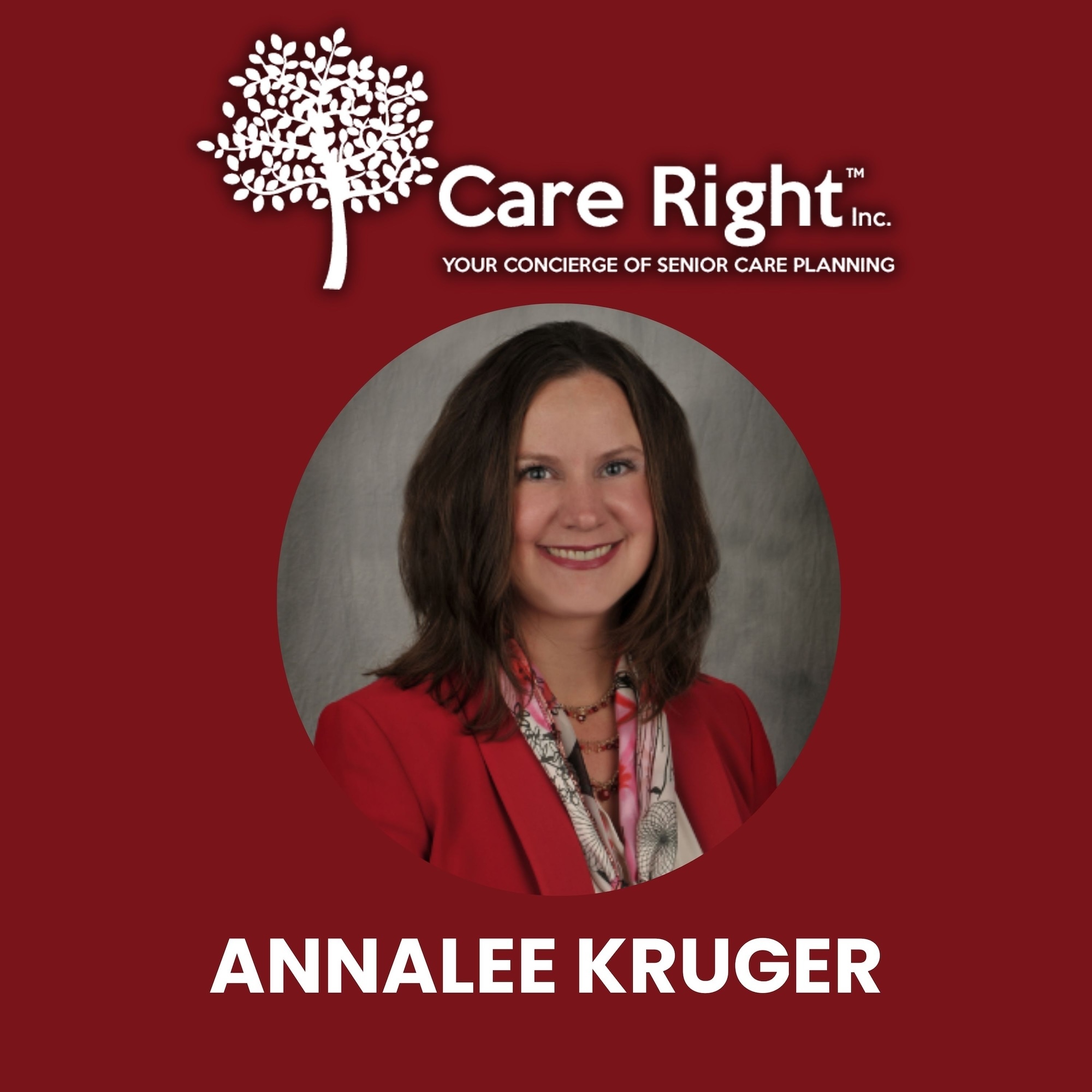
614
Downloads
99
Episodes
Family caregivers across the nation are finding themselves thrust into the role of caring for aging loved ones without ever having any family discussion about the ”what is” of aging. Families are not talking about care needs, caregiver burnout, the costs of care, dementia, other disease progressions, and they aren’t putting proactive plans in place. If you find yourself in this predicament, you need to listen to our ”Tired” podcast series
Episodes
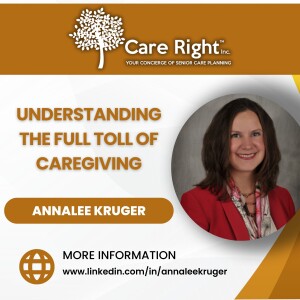
Friday Oct 11, 2024
Understanding the Full Toll of Caregiving
Friday Oct 11, 2024
Friday Oct 11, 2024
In today's fast-paced world, the role of caregivers is both crucial and deeply underestimated. With November being National Caregivers Month, it's imperative that we shift our focus towards planning for aging and supporting those who care for our loved ones.
Annalee Kruger, of Care Right Inc., joins Katana Abbott on the Smart Women Talk podcast to discuss some eye-opening truths and strategies surrounding caregiving and aging plans. Stay tuned!
Quotes:
- “Because I've worked in crisis management my entire career, I understand that people's lives can be peachy one second and not the next." - Annalee Kruger
- “It's crucial to communicate what you have in order, not just to have documents, but for your family to know what those documents mean.” - Annalee Kruger
- “Denial is a great place to be until you can't be there anymore, and then reality wakes you up, and then you have to do something.” - Annalee Kruger
Takeaways:
-
Develop a Comprehensive Aging Plan: Begin by having open discussions with your loved ones about their future care needs. Cover topics such as financial planning, medical wishes, power of attorney, and long-term care insurance. Document these discussions to be prepared for any medical crises that may arise unexpectedly.
-
Regularly Check in With Aging Family Members: Instead of just making phone calls, schedule regular video chats, and visit them periodically to observe their living conditions. Look for signs of caregiver burnout, and assess their physical and mental well-being to determine if additional support or changes in care are necessary.
-
Engage a Neutral Third-Party Facilitator: If family discussions about caregiving become difficult or contentious, consider hiring a neutral third-party facilitator to guide these conversations. This can help ensure that everyone’s views are heard and that decisions about care are made collaboratively and compassionately, minimizing potential disputes.
Conclusion:
Our understanding of caregiving must shift from a reactive mindset to one of proactive planning. By considering options before a crisis arises, families can create a financial and emotional roadmap that ensures a smoother aging process. This foresight allows individuals to navigate the challenges of caregiving with dignity and confidence. Ultimately, thoughtful planning enhances the quality of care for aging loved ones and provides peace of mind for their families.
Resources:
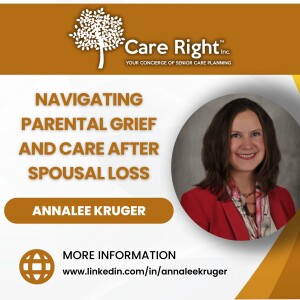
Friday Sep 13, 2024
Navigating Parental Grief and Care After Spousal Loss
Friday Sep 13, 2024
Friday Sep 13, 2024
The death of a spouse can significantly disrupt an aging parent’s sense of stability and purpose, making support from family and friends essential in helping them adjust. As they face new realities, from managing daily tasks to processing deep grief, the presence of caring individuals can ease this difficult period. Offering empathy and understanding is key to helping them move forward.
Annalee Kruger, of Care Right Inc., joins Nicole Will on the willGather podcast to talk about how to support aging parents who have lost their spouse. Annalee, with over 25 years of experience in the senior care industry, shares her insights on dealing with complex emotions of grief, ensuring safety and well-being, and the importance of having an aging plan in place. They explore practical steps for ensuring a supportive environment, leveraging technology for safety, and the significance of communication within families for better caregiving. Stay tuned!
Quotes:
- “It’s important to have a basic understanding of grief—there’s no timeline, and you can’t set expectations like, 'Well, it’s been three years, the house should be cleaned out by now.'" - Annalee Kruger
- “If we try to curb those feelings or dive back into work right away, or just push the grief aside, we won’t be able to fully appreciate our own grief. Without that understanding, we might struggle to fully appreciate the grief in someone else.” - Annalee Kruger
- “Caregiving and aging can be a positive experience if you have an aging plan, if your family is communicating properly, and if you have enough support in place. The more we can normalize these types of conversations, the better prepared we will be.” - Annalee Kruger
Takeaways:
-
Creating opportunities for sharing memories and emotions can provide immense comfort to a grieving parent. Vulnerability can be powerful in connecting on a deeper level and fostering healing.
-
Having a comprehensive aging plan in place is essential. This includes understanding who managed various tasks within the household, from cooking to paying bills, and ensuring these tasks are covered moving forward.
-
Evaluate the home environment to ensure safety. This includes installing grab bars, ensuring proper lighting, leveraging technology for reminders and monitoring, and making necessary renovations to accommodate mobility issues.
Conclusion:
Planning and emotional insight are vital for supporting a parent after the loss of a spouse. Combining practical measures with heartfelt support helps elderly loved ones navigate their grief with dignity and security. By creating a comprehensive aging plan and encouraging open communication, families can better manage this transition, providing stability and peace of mind during difficult times. Effective planning ensures that loved ones receive the best support and care, turning a challenging phase into an opportunity for connection and growth.
Resources:
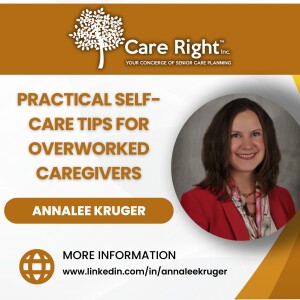
Friday Sep 13, 2024
Practical Self-Care Tips for Overworked Caregivers
Friday Sep 13, 2024
Friday Sep 13, 2024
The fast-paced and emotionally taxing nature of healthcare work often leaves little room for rest, making self-care essential for avoiding exhaustion and compassion fatigue. Regular attention to one’s own needs ensures that healthcare workers can continue to perform at their best without sacrificing their own well-being. It's a vital balance to prevent long-term harm to both personal health and patient care quality.
Annalee Kruger, of Care Right Inc., joins Valerie Van Booven again on the Senior Care Industry Netcast to share her journey from leaving a toxic corporate job to starting her own company in 2011. She discusses the importance of self-care, especially in demanding healthcare environments, and provides practical advice for those considering entrepreneurship. Annalee's insights emphasize maintaining personal well-being and healthy work environments. Stay tuned!
Quotes:
- “If we aren’t our best selves, we won’t be our best nurse, our best social worker, or our best spouse." - Annalee Kruger
- “Now is the time. With the pandemic, families are looking for help. Start your own consulting company—if not now, when?” - Annalee Kruger
- “If your current job or employer isn’t making your heart pound, I’m here to tell you life is too short. Find something that does.” - Annalee Kruger
Takeaways:
-
Despite the demands of caregiving, it's vital to set aside time for your own health and well-being. Caregivers often neglect their own needs, leading to burnout and health issues. They need to make time for exercise, healthy eating, and relaxation to better manage stress and maintain their overall health.
-
Be aware of the signs of stress and burnout. Small indicators can snowball into significant issues if not addressed. Recognizing when an environment is unhealthy and having the courage to make necessary changes is essential for long-term well-being.
-
With the caregiving industry in high demand, those feeling unappreciated in their current roles have to consider starting their own consulting business. This can offer greater control over your work environment, allow you to make a more significant impact, and create a healthier and more fulfilling career path.
Conclusion:
Self-care is essential for caregivers to effectively support others. Caregiving goes beyond physical assistance; it requires emotional and mental well-being as well. By prioritizing their own health, listening to their bodies, and exploring new opportunities, caregivers can better manage the demands of their roles. Empowering oneself not only brings personal fulfillment but also enhances the quality of care provided. Ultimately, a healthy, well-supported caregiver is best equipped to offer the highest level of care to those in need, making self-care the first step in caring for others.
Resources:
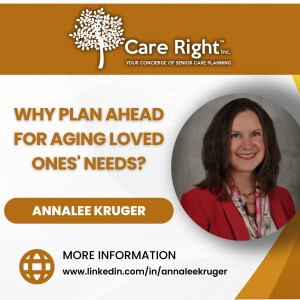
Thursday Sep 12, 2024
Why Plan Ahead for Aging Loved Ones' Needs?
Thursday Sep 12, 2024
Thursday Sep 12, 2024
The importance of an aging plan lies in its ability to offer peace of mind by clearly outlining preferences for care, housing, and legal matters before they become urgent. This proactive approach allows individuals to express their wishes and avoid situations where others must make critical decisions without guidance. It provides a sense of preparedness for both the individual and their family.
Annalee Kruger, of Care Right Inc., joins Karl Frank and Nathan Merrill once again on the Expert Network Team podcast to continue highlighting the importance of creating a comprehensive aging plan to ensure independence and dignity for seniors. They talk about driving safety, home safety adaptations, socialization, medication management, and the critical role of the primary caregiver. The episode features an alarming case study underscoring the consequences of not having an aging plan in place. Annalee also emphasizes the need for families to understand dementia and encourages planning ahead to prevent crises. Stay tuned!
Quotes:
- “Caregivers can easily become overwhelmed with the day-to-day responsibilities, which is why it’s crucial to have a detailed plan in place." - Annalee Kruger
- “If this family had an aging plan, they would have understood the disease progression and the risk of wandering and elopement.” - Annalee Kruger
- “How can you expect a power of attorney to do their job when you didn’t give them the tools they need to do their job?” - Annalee Kruger
Takeaways:
-
Creating an aging plan is essential for maintaining independence and dignity in later years. An aging plan should cover various aspects, including driving safety, mobility, companionship, and healthcare. It’s not just about immediate needs but also planning for future contingencies.
-
Regularly assess and adapt the living environment to ensure it remains safe. This includes checking for hazards like worn-out carpets, inadequate lighting, and ensuring furniture is appropriately placed for easy access.
-
Tools such as Life360 apps, Apple Watches, and other health-monitoring devices can provide peace of mind for families and caregivers, ensuring they can track and monitor their loved ones' well-being effectively.
Conclusion:
Proactive planning is essential for effective senior care. A detailed aging plan that covers all aspects of an individual’s life, from mobility and healthcare to socialization, greatly improves their quality of life. It also provides peace of mind for families and caregivers. By starting early and being thorough, families can confidently navigate the challenges of aging, ensuring their loved ones are well-supported and cared for.
Resources:
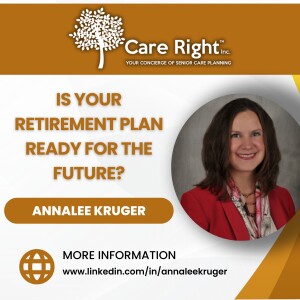
Thursday Sep 12, 2024
Is Your Retirement Plan Ready for the Future?
Thursday Sep 12, 2024
Thursday Sep 12, 2024
Having an aging plan allows individuals to confront the reality of aging with preparedness rather than fear, turning an uncertain future into one with structure and clarity. It gives people the power to shape their later years according to their own vision and values.
Annalee Kruger, of Care Right Inc., joins Karl Frank and Nathan Merrill on the Expert Network Team podcast to discuss the importance of creating comprehensive aging plans to ensure independence and dignity for seniors. Annalee shares her journey into elder care, emphasizing the significance of understanding the aging process and having a viable, sustainable plan. She outlines the detailed steps and resources her consultancy provides to families, including family mediation, caregiving strategies, and the critical role of financial and estate planning in the aging process. Stay tuned!
Quotes:
- “Kids are now seeing their parents in a different role. Mom and Dad may be frail, have dementia, and need help." - Annalee Kruger
- “If they don't understand the disease and the family doesn't communicate effectively, they can't make informed decisions.” - Annalee Kruger
- “Families often stop trying because their relationships begin to strain.” - Annalee Kruger
Takeaways:
-
There is a need for open communication and proactive planning within families. This prevents the strain on relationships and ensures everyone is on the same page.
-
Families often find themselves burned out and overwhelmed by the time they seek help. Professional consultants provide tailored support to help families create comprehensive and viable aging plans that address their unique needs and circumstances.
-
It is essential to integrate aging plans with financial and estate planning. Understanding the cost of care and the different options available can prevent families from making uninformed decisions that might jeopardize future care.
Conclusion:
Proactive aging planning is essential to avoid the emotional and financial challenges that often arise with aging. By planning ahead, families can ensure their loved ones maintain dignity and independence in their later years. Open communication, professional guidance, and comprehensive financial and estate planning are key to making informed decisions. Without understanding the issues or communicating effectively, families may struggle to navigate these complexities successfully.
Resources:
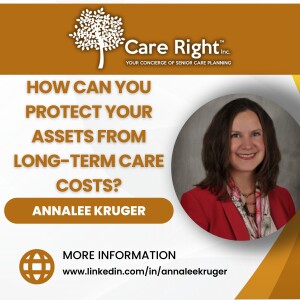
Wednesday Sep 11, 2024
How Can You Protect Your Assets from Long-Term Care Costs?
Wednesday Sep 11, 2024
Wednesday Sep 11, 2024
Quotes:
- “Caregivers are often the invisible patients. They carry a heavy burden, and their own health can deteriorate as they prioritize their loved one's well-being." - Annalee Kruger
- “Families often don’t realize how important it is to plan ahead until they’re faced with a crisis. By then, it’s often too late to make thoughtful decisions.” - Annalee Kruger
- “The denial and procrastination of addressing dementia or memory care issues can lead to a loss of control and create a more difficult situation for everyone involved.” - Annalee Kruger
Takeaways:
- Waiting until a crisis occurs can lead to rushed decisions and increased stress. By organizing important documents and having conversations about preferences for care early, families can navigate the aging process with more ease.
- Many people assume that Medicare will cover all costs associated with elder care, but this is a common misconception. Understanding the differences between Medicare, Medicaid, and other care options to better prepare financially and logistically for the future is important.
- Caregivers, whether they are spouses or adult children, often neglect their own health and needs while caring for a loved one. The well-being of the caregiver is crucial to the overall care dynamic. Ensuring they receive proper support and respite is vital.
Conclusion:
Resources:
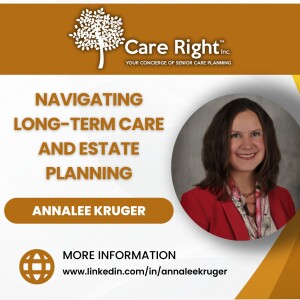
Tuesday Sep 10, 2024
Navigating Long-Term Care and Estate Planning
Tuesday Sep 10, 2024
Tuesday Sep 10, 2024
As people age, their needs and resources can evolve rapidly, making it crucial to have a well-thought-out aging plan to navigate potential shifts in health, mobility, and financial stability. Such plans help mitigate the impact of these changes, reducing uncertainty and enhancing overall well-being.
Annalee Kruger, of Care Right Inc., joins The Mattar Firm's Claudia De Jesus on the Protect Your Stuff show to share insights on proactive aging plans, the significance of having a 'grab and go' binder, and the importance of advanced directives. The episode emphasizes the holistic and personalized approach needed for effective estate planning and caregiving, highlighting the collaboration between legal, health, and financial advisors. Stay tuned!
Quotes:
- “Families are usually caught off guard and they're very overwhelmed about having to make quick decisions and major decisions quickly." - Annalee Kruger
- “I started Care Right with the mission of helping families be proactive in having these difficult conversations, preferably while things are still going well.” - Annalee Kruger
- “Trying to be organized will save you time, money, and stress.” - Annalee Kruger
Takeaways:
-
Having conversations about aging plans and medical wishes should happen before any crisis hits. These include discussions about healthcare proxies, living wills, power of attorney, and financial plans.
-
Essential documents such as long-term care insurance, life insurance policies, and legal directives should be organized and easily accessible in a grab-and-go binder. This can save family members time, stress, and money during emergencies.
-
Legal and healthcare documents should be reviewed regularly. Changes in health, financial status, or family dynamics might necessitate updates to ensure they are still valid and accurately reflect current wishes.
Conclusion:
Proactive planning and open communication are critical in navigating the complexities of aging and long-term care. By organizing essential documents and holding necessary conversations early, families can avoid the stress and financial strains that often accompany unplanned crises. Taking charge of your future with the proper resources and guidance ensures that you and your loved ones are well-prepared for any eventuality, allowing for smoother transitions and more effective support through life’s inevitable changes.
Resources:
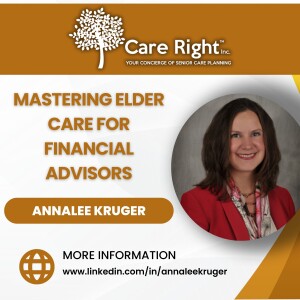
Tuesday Sep 10, 2024
Mastering Elder Care for Financial Advisors
Tuesday Sep 10, 2024
Tuesday Sep 10, 2024
Aging plans are vital for preserving dignity and autonomy as individuals face the physical and cognitive declines of later life, allowing them to make informed decisions about their care and living arrangements. These plans help ensure that personal values and wishes are respected throughout the aging process.
Annalee Kruger, of Care Right Inc., joins Steve Seid and Kurt Dupuis on The Whole Truth podcast to discuss the importance of developing comprehensive aging plans for senior care, highlighting the role of financial professionals in supporting their clients. Annalee shares insights on the pillars of effective aging plans, family mediation, and the essential tools caregivers need. Stay tuned!
Quotes:
- “Aging can be a disaster for families, but it doesn't have to be." - Annalee Kruger
- “The only way to marry or unite those sets of goals is through having an aging plan.” - Annalee Kruger
- “When you have parents that are resistant, speak from the heart.” - Annalee Kruger
Takeaways:
-
Proactive planning helps avoid crises and ensures everyone's wishes are respected. Families often don't realize how crucial it is until they are in a stressful situation, but starting early can save heartache and financial strain.
-
Having open and honest discussions about end-of-life care and aging can help prevent misunderstandings and conflicts. Understanding everyone's perspective and communicating clearly about future needs is a cornerstone of creating a solid aging plan.
-
Navigating the complexities of aging, from healthcare to legal documents, is challenging. Leveraging the expertise of professionals can guide families through this process, ensuring they have all the necessary documentation and plans in place.
Conclusion:
Proactive planning is essential when facing the challenges of aging and caregiving. Early preparation can make a significant difference in the overall well-being of both the elderly and their caregivers. By having conversations early, understanding the available care options, and seeking professional guidance if necessary, families can avoid the turmoil and conflict that often accompany crisis situations.
Resources:
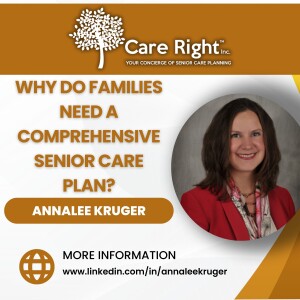
Monday Sep 09, 2024
Why Do Families Need a Comprehensive Senior Care Plan?
Monday Sep 09, 2024
Monday Sep 09, 2024
The process of aging often brings unforeseen challenges, making it crucial to have a plan in place that anticipates future needs and preferences. An aging plan empowers people to make decisions with clarity and confidence rather than leaving these choices to chance or crisis.
Annalee Kruger, of Care Right Inc., joins Jeremy Keil on the Retirement Revealed podcast to provide invaluable insights into the importance of creating a proactive aging plan. Annalee's expertise shines through as she discusses the complexities of senior care planning, offering practical advice to help families navigate these challenging waters with confidence and clarity. Stay tuned!
Quotes:
- “92% of my families come to me in the midst of a crisis." - Annalee Kruger
- “We have an aging crisis out there and a family caregiver burnout crisis that no one is addressing properly.” - Annalee Kruger
- “Families often don't realize the importance of planning until they are in a crisis. Proactive aging planning can save them from heartache and financial burdens in the future.” - Annalee Kruger
Takeaways:
-
Waiting until a crisis emerges can lead to rushed decisions and increased stress. Begin by organizing important documents and having conversations about preferences for care with your loved ones.
-
Understanding the differences between Medicare, Medicaid, and other care options can significantly impact the decisions you make. Investing time in learning about these services can help you make more informed choices.
-
If the complexities of planning and caregiving feel overwhelming, seeking professional help can provide much-needed support and clarity. Some companies offer tailored services to guide families through the process and ensure they are well-prepared for the future.
Conclusion:
Proactive planning is essential when facing the challenges of aging and caregiving. By preparing early, individuals can better manage the complexities and uncertainties that arise, ensuring more stability and peace of mind. This foresight allows for smoother transitions and more effective support for both caregivers and their loved ones. Creating an aging plan today can save families significant emotional and financial stress tomorrow, ensuring that everyone involved can navigate these changes with confidence and a sense of security.
Resources:
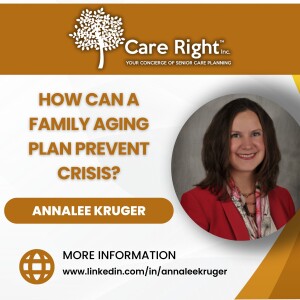
Monday Sep 09, 2024
How Can a Family Aging Plan Prevent Crisis
Monday Sep 09, 2024
Monday Sep 09, 2024
Aging plans are essential for ensuring that individuals can maintain their quality of life as they grow older, offering a roadmap to address healthcare, housing, and financial stability in a changing physical and emotional landscape. Without proactive planning, aging can lead to unnecessary stress for both individuals and their families.
Annalee Kruger, of Care Right Inc., joins Valerie Van Booven on the Senior Care Industry Netcast to share her journey of starting a company that helps families create aging plans to mitigate medical crises and caregiver burnout. Through video conferencing, Care Right has provided nationwide services, emphasizing the importance of planning and utilizing tools like the 'Grab and Go' binder. They discuss the benefits of virtual work, the challenges in senior care, and how to improve client advocacy and inter-provider collaboration. Annalee also highlights the role of technology in revolutionizing senior care and the importance of being innovative in the healthcare industry. Stay tuned!
Quotes:
- “Families often don't realize the importance of planning until they are in a crisis. Proactive aging planning can save them from heartache and financial burdens in the future." - Annalee Kruger
- “We have to stop passing the baton because these people drop off, you know, they get lost in the shuffle. Our patients and our families and clients deserve better.” - Annalee Kruger
- “You always have to be a pioneer and think outside the box instead of just following mainstream, how things have always been done.” - Annalee Kruger
Takeaways:
-
Establishing an aging plan before a crisis hits can significantly reduce stress and improve decision-making. It's crucial to organize important documents and have conversations about future care preferences.
-
Virtual services, like video conferencing, enhance accessibility and efficiency in senior care. It's essential to leverage technology to improve service delivery and client connections.
-
Senior care providers should work together rather than in silos, making referrals to other resources and being better advocates for their clients’ needs. This collaborative approach leads to improved outcomes for families and seniors.
Conclusion:
Proactive planning and embracing technology are essential strategies in senior care, providing stability and peace of mind for families facing the challenges of aging. Annalee underscores the importance of preparing ahead, leveraging technology, and advocating for clients to ensure they receive the best possible care. By planning early, families can navigate the complexities of senior care more smoothly, fostering better outcomes and healthier relationships.
